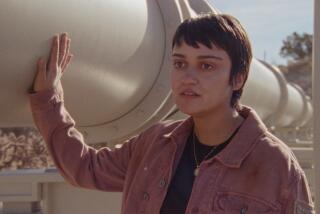High times and adventures
- Share via
It’s been almost a year since the screenwriting team of Seth Rogen and Evan Goldberg braved the summer-pic sinkhole of August with “Superbad,” a deceptively trashy hit comedy about two joined-at-the-hip teens named Seth and Evan coping with the pain of imminent separation.
Watching Rogen and Goldberg’s shaggier dog-day offering, “Pineapple Express,” one imagines that it’s just the sort of picture that their fictional namesakes would have brainstormed if, years after college, they ran into each other by the Beverly Wilshire pool and decided to make a stoner movie.
“Superbad,” which traced the obstacle-strewn path of underage guys on the prowl for booze and sex, concealed the soul of a buddy thriller beneath its “American Pie”-ish veneer. The yen for the ultimate cannabis high drives the protagonists of “Pineapple Express,” which wears its “Midnight Run” leanings on its facetiously violent, rambunctiously amusing sleeve.
The intoxicants of choice may vary from one picture to the next but the heartfelt impulse remains the same. In the dude-bonding world according to Rogen and Goldberg, there is no love more sacred, or absurd, than the love a guy feels for his male comrades in substance abuse.
In “Pineapple Express,” as it happens, the getting of the ultimate joint is never as thorny as the disposing of it. Rogen plays Dale Denton, a process server who eases the tension of serving subpoenas upon unsuspecting victims by being stoned as much as possible. His weed dealer, Saul (James Franco), a hippie-tressed couch potato with a taste for pickles and “Godspell” striped pants, obliges him with a unique, high-test plant from which the film takes its title.
Saul’s revered pineapple express is so rare, indeed, that it is easily traceable back to its smoker. This becomes a vexing issue for Dale when he leaves a roach behind at the scene of a crime he has just witnessed, the murder of an Asian crime boss at the hands of a corrupt cop (Rosie Perez) and her drug lord lover (Gary Cole). Finding himself a gangland target, Dale efficiently implicates his high-school-aged girlfriend Angie (Amber Heard), her parents (Ed Begley Jr. and Nora Dunn) and the epically out-of-it Saul.
Despite Dale’s seeming devotion to Angie, it is Saul who quickly vaults to the No. 1 spot in his affections, as the two men connect over their shared enthusiasm for pot and mutual fear of being whacked at a tender age by gun-toting thugs. The clincher is a “Butch-and-Sundance”-redolent courting montage, wherein the two amigos leapfrog and cavort in a stoned reverie that culminates in a chaste, 18-hour siesta.
Rogen, who exudes the chaotic gravitas of a bar mitzvah class valedictorian gone off the tracks, and Franco, a prom king with an inner Alley Oop, convey a loose, raffish simpatico that builds upon their history as alumni of “Freaks & Geeks.” That was, of course, the lamented TV series that catapulted the career of “Pineapple Express” co-producer Judd Apatow, who begat “The 40-Year-Old Virgin” and “Knocked Up” as writer-director. It’s interesting to watch Rogen play the “straight” foil to Franco’s stoner clown, particularly when one considers that the pair were briefly thought of in reverse roles. But it’s better this way. As was the case with his gentleman slacker in “Knocked Up,” Rogen’s unique comedy engine is oiled by the tension between the urge to veg and the need to act responsibly.
In the role of dramaturge, Rogen and his co-scripter Goldberg lack Apatow’s discipline and deft hand for peripheral characters; the writing in “Pineapple Express” gets lazy whenever it strays too far from its central axis of players. But the screenwriters also know the value of a good third wheel, as was evidenced by the generous, savior-geek personage of Fogell that spotlighted the then-unknown Christopher Mintz-Plasse in “Superbad.”
In “Pineapple Express,” the Fogell honors go to Danny McBride. As Saul’s weirdo middleman Red, a loner with a wiry, Memphis-roadhouse hairdo and a sentimental attachment to his dead cat, the actor affects a fey pose that belies the character’s fight-to-the-finish pugnacity. McBride underplays to an eccentrically funny fare-thee-well, and we miss him whenever Red is off screen.
--
“Pineapple Express.” MPAA rating: R for pervasive language, drug use, sexual references and violence. Running time: 1 hour, 52 minutes. In general release.
More to Read
Only good movies
Get the Indie Focus newsletter, Mark Olsen's weekly guide to the world of cinema.
You may occasionally receive promotional content from the Los Angeles Times.










